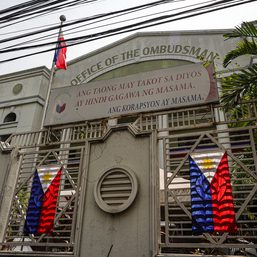SUMMARY
This is AI generated summarization, which may have errors. For context, always refer to the full article.

AT A GLANCE:
- A logistics firm contracted by DepEd, Transpac Cargo Logistics Inc. (Transpac), bagged a lucrative deal with DepEd in 2021 as lockdown restrictions eased, edging out bigger players with more assets and resources.
- Revenues of Transpac took a big hit during the pandemic, dropping by 56.7%.
- A document obtained by Rappler showed that DepEd owed Transpac P34.5 million – the reason why Transpac’s subcontractors sold laptops in a bid to recover lost income.
- DepEd moved too slowly to stop the sale of stolen laptops in stores and Facebook marketplace, even after the discovery of the irregular activities.
Conclusion
PART 1 | Negligence, corruption lead to fire sale of DepEd laptops
MANILA, Philippines – Prior to bagging the P667-million deal with the Department of Education (DepEd), Transpac Cargo Logistics Inc. (Transpac), a little known Las Piñas-based logistics firm, had a tough year – just like most businesses during the pandemic.
In 2020, Transpac revenues nosedived by 56.7%, ending the year with P39 million in revenues, as the country went into lockdown at the onset of the coronavirus outbreak.
Its net income was hit even harder. Transpac recorded a net income of P204,627 in 2020, a dramatic 92% drop from 2019, according to financial records obtained from the Securities and Exchange Commission.
As COVID-19 restrictions eased in 2021, Transpac sought to recover what it could.
And it was in luck.
2021 was when DepEd would – for the first time in recent history – seek to outsource almost all of its logistics needs to a single provider, bidding out a P671-million contract. This amount was worth more than the P451,333,921 total revenue Transpac earned in five years, from 2016 to 2020.
How did a company that did not appear to have warehouses or assets outside Metro Manila (and based on its financial statements, have very little liquidity) bag such a lucrative contract?
On the surface, the bidding and awards process appears to have been above board. And while the company was not yet in the red, a closer look at Transpac’s financial statements revealed that, for an enterprise of its size, taking on the enormous responsibility of distributing billions worth of DepEd technology and materials nationwide, was biting off more than it could chew.
Little known company
Transpac was founded in 1997 as Transpac Container Line Inc., before it amended its articles of incorporation in 2019 to reflect its current name, Transpac Cargo Logistics Inc.
Among Transpac’s incorporators are Sean M. Paler, the company’s vice president of sales and operations, and Maria Luisa M. Paler, who is listed as the corporate secretary. The company is classified as a “small entity” based on Philippine Financial Reporting Standards, or companies with total assets and liabilities between P3 million and P100 million.
Very little is known about the Palers, however, and how the company was able to bag the DepEd contract.
“The industry is in the dark on who is really behind Transpac other than its listed president is Win Paler,” a source from the business community told Rappler. “Win Paler” is Winfred A. Paler, president of Transpac and the father of Sean, who signed the DepEd contract. Win passed away recently, Rappler learned.
Transpac’s Facebook page, created in July 2020, has been mostly inactive, with its most recent post being made close to three years ago, on August 29, 2020. The post merely updated the company’s contact information.
The website says the company offers air freight shipping, express delivery, trucking services and air cargo charter services. It provides no information about office location nor the names of management and staff. Neither is there much info about the company’s track record.
Based on a search at the Philippine Government Electronic Procurement System (PhilGEPS) site, prior to the DepEd contract, Transpac handled mostly smaller piecemeal contracts for Philippine Postal Corporation (PhilPost) in 2017.
In the same year (2017), the company was awarded contracts totaling P4.75 million to haul mail from the Philippines to South Korea, Switzerland, Spain, Taiwan, France, the United Kingdom, Australia, and Singapore.
It got another award in April 2017 from Philpost for P63.164 million for the air delivery of domestic mail until April 2018.
These contracts were easier to pull off and were worth a fraction of the multi-million-peso 2021 DepEd deal.
Edging out competition
Five companies participated in the bidding for the contract: Ximex Delivery Express (XDE) Logistics, Airspeed International, Metro Pac Movers (MetroPac), One Stop Logistics Inc. (OSLI), and Transpac.
XDE was founded in 1988 by Jerome S. Ibañez from Cagayan de Oro, according to its website. It offers land, air, and sea freight services, as well as door-to-door courier services. Its head office is in Taguig with a corporate office in Muntinlupa. The company’s page says it has 1,000 vehicles, 2,000 employees and contractors, and 17 regional offices in Luzon, six offices in the Visayas, and six in Mindanao.
Parañaque-based Airspeed International already has warehouses and distribution operations in all regions, according to its website. MetroPac, a logistics company under the Metro Pacific Group of business tycoon Manny Pangilinan, and OSLI, a company under Magsaysay Shipping Lines, are businesses with far more capital and assets than Transpac.
MetroPac is a logistics company founded in May 2016. According to its website, “the core business of MetroPac Movers, Inc. is focused on providing first-class warehousing and cold storage distribution centers.” OSLI, on the other hand, is based in Metro Manila with six regional offices, and is “powered by Magsaysay Group’s full service integrator for all logistics requirements.”
Transpac was able to beat them all.
Under the procurement law and requirements of the DepEd Bids and Awards Committee (BAC), the winning bidder should first qualify under net financial contracting capacity (NFCC) requirements, a mathematical formula that is supposed to determine financial capacity. Second, it should have had two previous contracts within the past five years worth 50% and 25% respectively, of the P671-million value of the logistics deal.
Based on data from Transpac’s audited financial statements, the company met the NFCC requirement. It is unclear whether it met the second requirement.
According to DepEd’s award resolution dated August 26, 2021, XDE had the lowest calculated bid for the project but was “post-disqualified,” meaning, it was disqualified after the bidding closed, for “failure to comply with requirements.”
OSLI was disqualified, too, for failing to submit a “financial bid form,” a mere procedural requirement. Airspeed International had the second-lowest bid, but was disqualified for failure to comply with the requirements.
Transpac’s winning bid was for a total of P667,450,729.
Rappler requested DepEd for a copy of Transpac’s complete bid documents, as well as the documents of other bidders to check whether the second procurement and BAC requirements about previous government projects was met. Also, the award resolution did not include the exact amount of the bids, the detailed explanation for the disqualifications, nor specific requirements other bidders might have failed to meet.
A formal request was sent to DepEd on March 6 and subsequent follow-ups were made four times between March 9 and May 2. We have yet to receive the requested documents.
Little cash, big risks
Transpac had only P7.1 million in the bank as of 2021, according to financial records. This is not nearly enough to cover operating costs. The company had to have either sufficient bank loans, credit, or great confidence to take on an operation of this magnitude. Or, this was simply a risk the company was willing to take, given a P667 million payday at the end of the one-year contract – an amount of income Transpac had not seen in recent years.
The contract itself mentioned no specific date nor time period as to when the payment for the project should be made, only saying that “Payments shall be made to TRANSPAC within a reasonable period after receipt of invoice or billing and complete documentation as stated above.”
According to Transpac’s demand letter, the department received Transpac’s invoice on May 5, 2022.
Prior to the DepEd project, based on its 2020 audited financial statement, Transpac had only one warehouse under lease in Pasay City.
This meant that signing the deal for the national project would require the company to scale up quickly and set up one 2,000-square-meter central warehouse in Carmona, Cavite, and 15 additional 200-square-meter warehouses in every region – if it was to begin distribution by December 9, 2021. According to the contracts, the warehouse agreements were valued at P34.5 million for the regional warehouses, and P23 million for the larger central warehouse.
To staff these warehouses and distribution centers, Transpac needed to recruit subcontractors to deliver to the nearly 50,000 public schools across the country. The use of subcontractors to augment the logistics provider’s staffing needs was allowed as long as it did not exceed 20% of the total project cost, according to DepEd’s bidding documents.
By November 2022, already a year after Transpac – a company that badly needed to recover from its rough pandemic year – began working with DepEd, more money was going out than coming in. And the longer operations continued without payment from DepEd, the more its operating and financial expenses compounded by the day.
In a letter obtained by Rappler dated November 18, 2022, addressed to DepEd Undersecretary for Administration Kristian Ablan, Transpac demanded that DepEd – under the new administration – settle its obligations.
“These costs continue to create a dent on the cash flow of Transpac and have the obvious effects of diminishing the ability of Transpac to perform under the contract. Needless to state that the contract is reciprocal in character and Transpac’s capacity to perform is to a significant degree dependent on DepEd’s willingness to pay promptly,” Paler, vice president for sales and operations, wrote in his letter.
The unpaid millions in collectibles prompted Transpac to suspend deliveries to schools.
During the period that Transpac was DepEd’s sole logistics provider, it was tasked with moving billions worth of government-owned chairs, tables, laptops, books, and other school equipment from suppliers, to warehouses, and then to schools.
Rappler reached out to Sean Paler through text messages and a phone call to get Transpac’s side, but he has not yet responded as of posting. We will update this story once he does.
Subcontractors sold laptops
Was Transpac or its subcontractors responsible for the sale of the blue Coby NBPC laptops in HMR Trading Haus branches and the open market?
Even after reports about missing government property first came out, HMR and dozens of other resellers continued for weeks to advertise and sell the Coby laptops in the Facebook marketplace in Cebu and Metro Manila – without any intervention whatsoever by DepEd.
By the time Transpac wrote DepEd for payment, the Marcos administration had taken over and Vice President Sara Duterte had assumed the post of education secretary as well.
“The request has been heaving, moving to and from the DepEd and Transpac, and among pertinent units of the DepEd, for numerous reasons. Thus to date, Transpac remains unpaid for the services rendered,” Paler’s letter to DepEd read.
Despite efforts to obtain more details from Paler and others at the company last December via email, phone calls, and a personal visit, and several more follow ups in March and April, company executives declined to comment and preferred to keep mum.
A source involved in DepEd’s procurement process and familiar with Transpac operations told Rappler that it was the subcontractors who allegedly ended up selling the DepEd laptops in an attempt to recoup what they could from the unpaid fees.
The same source blamed DepEd for losing the laptops and putting in peril other properties stuck in Transpac’s warehouses.
“The way I see it, it’s the inability and seeming lack of interest and know-how on the part of the contract management division and accounting division [of DepEd] to implement the contracts, particularly on the matter of payment and operations. This is compounded by the lack of guidance from the Usec [undersecretary] and/or Asec [assistant secretary] in charge. No expertise or familiarity seems to be present in the units currently assigned to work on the logistics system,” the source said.
The source was referring to Undersecretary for Administration Kris Ablan and Assistant Secretary Chris Arnuco.
DepEd, however, deflected the accusations, saying, there is “no liability to speak of” on the part of the department. DepEd spokesperson Michael Poa told Rappler in a text message: “The issue here is Transpac’s failure to fully perform and comply with the contract to deliver goods/equipment to our schools – going as far back as November 2021.”
In January 2023, through a department order, a procurement unit headed by Undersecretary Gerard Chan and Assistant Secretary Omar Romero was, however, created.
The DepEd order said that the revised designation of officials was to “improve upon the reporting structures, functions, and staffing compliments to ensure their relevance and responsiveness to the changing department.”
Ablan told Rappler that creating a separate unit dedicated to procurement would be beneficial to DepEd.
“Sa laki ng procurement requirements kailangan sariling strand. Commitment ‘yan ni VP Secretary,” he said. (Because procurement requirements are huge, a separate strand is needed. That’s a commitment of Vice President Secretary Sara Duterte.)
Internally, it is the contract management division that supervises contracts still active in the department, while the accounting division sees to it that suppliers and contractors get paid.
When shown on December 21, 2022, Transpac’s demand letter dated November 18 of the same year, Ablan told Rappler he wasn’t aware of it, and that it was the first time for him to see the letter. It took a full month from the date of the letter for Ablan to become aware of DepEd’s unpaid obligations at the time.
When initially asked about the resale of DepEd laptops in the market, Ablan said he didn’t know why the laptops were being sold and that he was unaware of the unpaid warehousing issue. He also said the matter was being investigated.
Pressed further for DepEd’s action on the issue, Ablan said in February, “It was already endorsed to accounting and legal departments.”
Rappler also reached out to Arnuco to get his side, but he declined to comment and instead referred us to the DepEd spokesman.
When asked whether payments had already been made to Transpac, DepEd gave no response despite several follow ups. We will update this story once we get a reply.
Slow to move
DepEd sources familiar with operations and who requested anonymity told Rappler there was no orderly transition and turnover between the previous to the current administration. This explains why critical projects like the DepEd Computerization Program faltered in implementation.
Neither did the current administration act promptly to exact accountability from the subcontractors responsible for the illegal sale of the Coby laptops, resulting in losses in public funds.
When the new Marcos administration took over in June 2022, they did not renew the contract with Transpac nor open up bidding for other contractors to take over.
In a phone call on February 20, Poa told Rappler that suppliers are now delivering equipment and supplies directly to intended schools – the way it used to be before the Transpac mess.
It took the DepEd under the new Marcos administration almost four months before it issued its first press statement on the missing laptops issue. It was only on February 20, 2023, when it first broke its silence to briefly say it was coordinating with law enforcement agencies “to apprehend the perpetrators.” Nearly three months later, no apprehensions have been reported.
To address its logistical and procurement issues, Philippine Business for Education executive director Justine Raagas said this kind of problem can be solved if big agencies (like DepEd) “decentralize” their procurement processes.
“Make it faster by making your regional unit or the local offices, make them accountable, but make sure that processes are still stringent,” she said. “It is an issue on delivery – bringing down the laptops to where they are intended. I guess, this is where our call for education governance and decentralization comes in,” Raagas added. – with research by Ailla dela Cruz/Rappler.com
Add a comment
How does this make you feel?
![[WATCH] Bamban POGO scandal: There’s a bigger fish than Alice Guo](https://www.rappler.com/tachyon/2024/07/inside-track-tcard-bamban-pogo.jpg?resize=257%2C257&crop=435px%2C0px%2C1080px%2C1080px)



![[OPINION] What kind of citizens are we?](https://www.rappler.com/tachyon/2024/07/tl-what-kind-of-citizen-are-we.jpg?resize=257%2C257&crop=333px%2C0px%2C1080px%2C1080px)

![[OPINYON] Tungkol sa naging viral na social media conjecture](https://www.rappler.com/tachyon/2024/07/thought-leaders-conjecture-07262024.jpg?resize=257%2C257&crop_strategy=attention)

![[EDITORIAL] Apat na taon na lang Ginoong Marcos, ‘di na puwede ang papetiks-petiks](https://www.rappler.com/tachyon/2024/07/animated-bongbong-marcos-2024-sona-day-carousel.jpg?resize=257%2C257&crop=280px%2C0px%2C720px%2C720px)



![[ANALYSIS] Challenges affecting the cold chain industry](https://www.rappler.com/tachyon/2024/05/tl-cold-chain-industry-challenges.jpg?resize=257%2C257&crop_strategy=attention)


There are no comments yet. Add your comment to start the conversation.